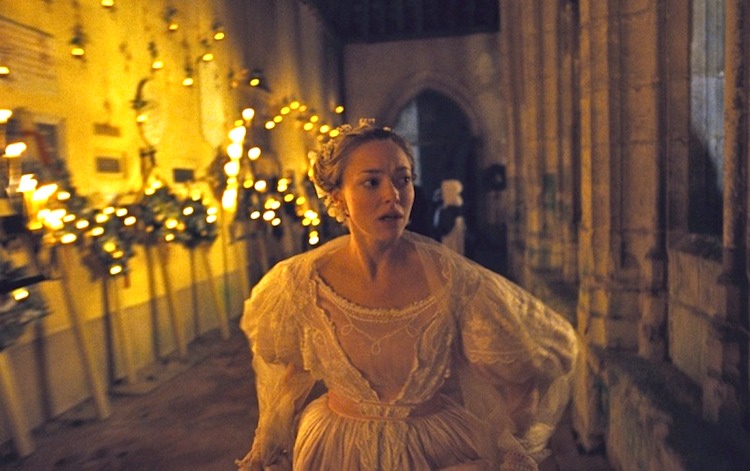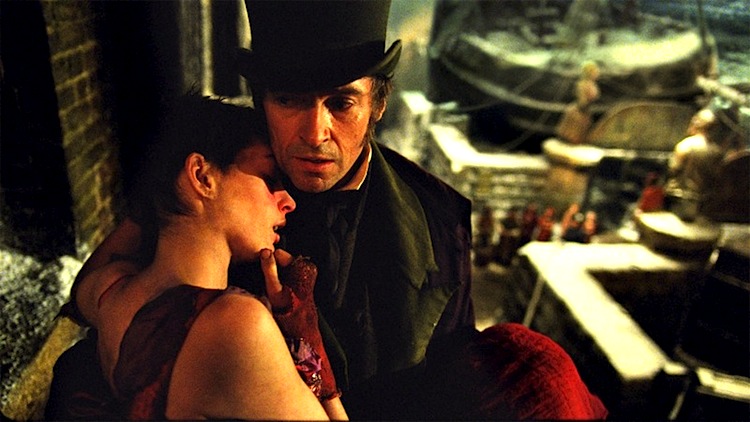
By Joe Bendel. Even viewers who have not read Victor Hugo’s novel or seen Cameron Mackintosh’s stage musical know Jean Valjean spent nineteen years in prison for stealing a loaf of bread. Such a fate is undeniably unjust, but it is important to keep in mind that it was a very nice sourdough. For years it has defied cinematic adaptation, but now Tom Hooper brings the musical Les Misérables to the big screen, with all its bombast. It opened yesterday nationwide, so Merry Christmas everyone.
Distilled from Hugo’s cinderblock sized novel, Les Mis follows Valjean after he is released from prison. He has been freed from the unyielding Javert’s lash, but the terms of his parole make him a desperate outcast. He finds temporary refuge with the truly pious Monsignor, but he abuses the kindly cleric’s trust. Yet much to his shock, his betrayal is met with forgiveness.
Thanks to the Monsignor, Valjean reinvents himself under an assumed identity. He becomes a factory owner and the mayor of his hardscrabble community. Then Javert is transferred to his jurisdiction. For a while they circle each other warily, until Valjean confirms the copper’s suspicions to save an innocent man arrested in his place. Thus begins his life on the run (albeit a relatively well-heeled one) with Cosette, the daughter of a tragic former employee, in tow.

Yes, this is Les Mis, a rather odd combination of Christian fellowship and proletarian solidarity. Barricades will definitely be stormed, but at least the church is not part of the apparatus of oppression. As the film’s publicity campaign is quick to point out, Hooper returned to old school movie musical production techniques, recording the actors in performance live on the set – rather than have them lip-sync to pre-recorded tracks. This allows them more in-the-moment interpretive freedom. However, as your TV talent show judges might say: “it gets a little pitchy, dog.” Frankly, it is hard to understand why they did not clean some of that up with Pro-Tools or a similar program.
Critical reaction to Hooper’s Les Mis is also something of spectacle, ranging from adulation to castigation. Word that Russell Crowe was making a movie musical may have led some to fear the worst. When Les Mis did not completely bite, many evidently concluded it must therefore be awesome. In truth, it falls somewhere in the middle.
To be fair to Crowe, he has been unduly hammered as Javert (a small irony there), but in the story’s abbreviated stage form, his character’s actions during the third act are jarringly problematic. Also: likely Oscar contender Anne Hathaway knocks “I Dreamed a Dream” out of the park, completely reclaiming the signature tune from Susan Boyle, and then promptly exits the narrative. Hugh Jackman has the perfect presence for Valjean and his performances of “Who Am I” and “One Day More” are fairly stirring, but the show definitely peaks in the first act. Frankly, all the third act barricade songs and revolutionary anthems just blend into a faux Internationale blur.
While Jackman, Crowe, and Hathaway meet or exceed expectations, the rest of the supporting cast is a dramatically mixed bag. Eddie Redmayne sorely lacks romantic lead credibility as Marius, but his voice is not bad. The real standout though is British fan favorite Samantha Barks. She is the real deal as lovesick Éponine, probably boasting the finest voice of the ensemble.
In contrast, Sacha Baron Cohen and Helena Bonham Carter quickly become tiresome as the felonious innkeeper Thénardier and his wife, the show’s ostensive comic relief. A little of them goes a long, long, long way. You know the Nile River? That long. They must have assumed they were in a Tim Burton movie when they saw the period sets, and started hamming it up accordingly. In fact, the Nineteen Century Paris recreated by the design team often looks like it was the work of the same Neo-gothic architect responsible for The Dark Knight’s Gotham, particularly when Javert compulsively paces about on high ledges.

Nonetheless, Les Mis its moments, like “I Dreamed a Dream” and “One Day More,” which might be Hooper’s best staging, utilizing the cross-cutting toolkit of music videos more than traditional movie musical production numbers. Elements of the show, like the touching relationship between Valjean and Cosette, prove to be absolutely bullet-proof.
Hooper and screen-adapter William Nicholson also deserve a lot of credit for not watering down the themes of faith and redemption. Indeed, it is refreshing to see a senior man of the cloth depicted in an unambiguously virtuous manner. Oddly though, when everyone hits the barricades, it becomes something of a bore. Recommended primarily for Les Mis devotees and diehard movie musical fans, Les Misérables opened yesterday (12/25) across the country, including the AMC Empire in New York. Merry Christmas and to all a good night.
LFM GRADE: B-
Posted on December 26th, 2012 at 12:05pm.